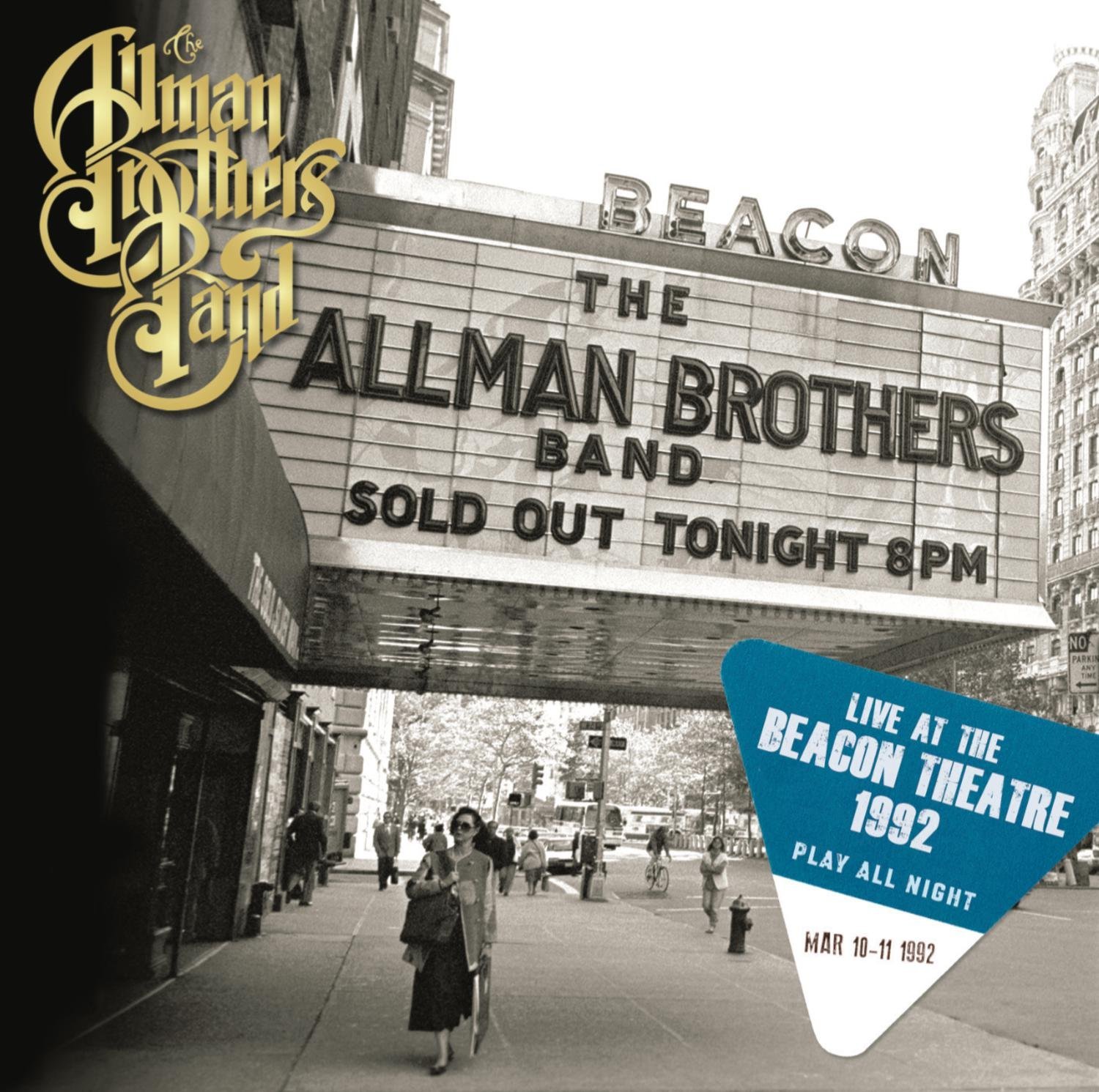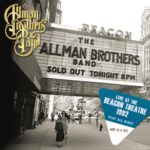
Epic/Legacy Recordings
If it hadn’t already been used for a 1994 studio album, the phrase “Back Where It All Begins” would have been an apropos subtitle for The Allman Brothers’ new archival release Play All Night. The band’s annual multi-night runs at NYC’s Beacon Theatre over the last 20-plus years have seen some of the modern-day ABB lineups’ most inspired playing. And Play All Night takes us back to the Allman Brothers’ very first stand there, back in March of 1992.
The Beacon runs have often featured some surprise guests, but for the performances captured on Play All Night there were none – nor were they needed. (Harpman Thom Doucette sat in, but he was as much a Brother as one could be without actually being one since the band’s early days.) The gold to be found in this 2-CD set is the presence of guitarist/vocalist Warren Haynes and the late Allen Woody on bass.
Fans will forevermore debate the best ABB lineup in the decades since the deaths of Duane Allman and Berry Oakley in 1971 and 1972, respectively. Different combinations of instruments and personalities made for different dynamics and vibes – some too different to be compared, perhaps. It seems apparent, however, that nobody came as close to Duane Allman’s ability to fly wingtip-to-wingtip with Dickey Betts as Warren Haynes did. There are numerous moments on Play All Night where Haynes is obliged to offer up key phrases that were originally birthed by Duane’s heart, hands, Les Paul, and Coricidin bottle slide – the opening wails of “Statesboro Blues” or the mist-wrapped moans of “Dreams” for instance – but he truly does manage to stand his own ground, as well. The interplay between he and Betts feels healthy and vibrant – the challenges fueled by the excitement of the moment, rather than ego or attitude. Haynes’ tone is sharp, while Betts’ is rounder; the passages of dual-guitar harmonies benefit from the contrast and the result is both fierce and lovely. And when they take turns making their own musical statements, there’s still interaction apparent rather than just empty comping during another player’s solo.
Allen Woody, meanwhile, pulls off the feat of somehow channeling Berry Oakley without mimicking him. He captures Oakley’s wallop and “lead bass” style, but keeps it fresh and unpredictable … as if Oakley had never taken that motorcycle ride in November of ’72 and had 20 years of maturity under his belt. Again, as in the case of Haynes, there are signature bass licks that must be played (is there any other way to righteously launch “Whipping Post”?) but Woody ventures beyond those time and time again, injecting Oakley’s presence into right-now jam situations during old classics – not to mention songs that were written after his death. For sure, his style is aggressive – but it’s never distracting.
Back in the engine room, percussionist Marc Quinones had only joined the band the year prior to the Beacon shows, but he had definitely found his space – and the Jaimoe/Butch Trucks team had definitely made room for him, as well. Listen to the spiraling madness of “Nobody Knows”: you can pick apart the textures of the three rhythm devils’ weaves or you can absorb it as the work of one multi-limbed beast. Regardless, it’s a large and powerful sound – a tribute to Marc Quinones’ ability to blend and inspire.
As mentioned, Dickey Betts sounds strong on Play All Night – his work on the jams is the classic Dickey that has inspired a couple generations of pickers: take a phrase; reshape it slightly; reshape it again; and again … until it becomes something else – but never losing the heart of the initial phrase. Vocally, he sings with passion throughout the set – as does Gregg Allman. If either one of them was wrestling demons during this period, it’s not evident in their playing here. Gregg’s keyboard work – often overlooked – was nuts-on for these Beacon shows, providing both a springboard for the Haynes/Betts fireworks and a guardrail for Woody to play off. If you had to pick one vocal performance off these two discs that summed up what Gregg Allman was all about, hands-down it would be “Get On With Your Life” – slam it in a mason jar, seal it, and write “cream of blues” on the label.
Never mind the debates about the best this and the most this and the greatest that: The Allman Brothers Band had some pretty powerful hoodoo under the hood in 1992 and was firing on all cylinders at the Beacon that March. Play All Night captures something that was unique to that combination of talents.
In the moment, they were brothers.
*****
Brian Robbins keeps his mason jars over at www.brian-robbins.com



No Comments comments associated with this post